Howard Andrew Jones's Blog, page 11
May 25, 2018
Updates
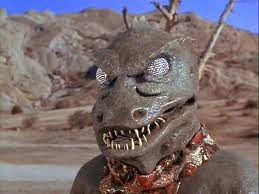 You may have noticed from the increased activity that I’m rethinking how I use my web site. I’ve got some more novel writing posts ready to go, and that will be a regular feature on Mondays for the next several weeks. I’ve also started exchanging notes with Tales From the Magician’s Skull contributors for the opening salvo in a new Friday feature I’m tentatively calling “Creatives Corner.” The plan is to post interviews or occasional guest posts on many Fridays, and I’m starting with some of the people who’ve worked with the mighty Skull.
You may have noticed from the increased activity that I’m rethinking how I use my web site. I’ve got some more novel writing posts ready to go, and that will be a regular feature on Mondays for the next several weeks. I’ve also started exchanging notes with Tales From the Magician’s Skull contributors for the opening salvo in a new Friday feature I’m tentatively calling “Creatives Corner.” The plan is to post interviews or occasional guest posts on many Fridays, and I’m starting with some of the people who’ve worked with the mighty Skull.
The object is to point visitors to neat sites, good writers, editors, and fans. If you have ideas about questions you’d like me to ask, guests you’d like me to invite, or even subjects you’d like to cover, please let me know.
Likewise, if you have questions about writing or publishing, keep them coming. I’m still working on answers to a few that were asked last time I mentioned this, and I’m eager for more ideas.
I hope to hear from you. So does The Gorn.
May 24, 2018
Interview Tonight
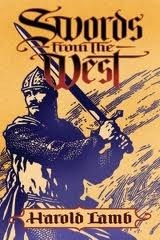 Tonight I’ll be dropping by Night Moves Radio to chat with hosts Josh and Ariana about sword-and-sorcery, its authors and its tales, and the writing and editing of the same. I hope you’ll drop in for a listen!
Tonight I’ll be dropping by Night Moves Radio to chat with hosts Josh and Ariana about sword-and-sorcery, its authors and its tales, and the writing and editing of the same. I hope you’ll drop in for a listen!
The show starts at 7:00 Central time and it’s going to be held live! I’ve been on plenty of podcasts before, but never a live one, so this should be different!
May 23, 2018
Language Use
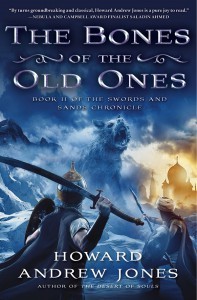 My friend Troy asked the other day about my ” ideas on usage of language – how you change it per the setting and world you are writing in, how you find not only the narrator’s voice, but the voice of your characters.”
My friend Troy asked the other day about my ” ideas on usage of language – how you change it per the setting and world you are writing in, how you find not only the narrator’s voice, but the voice of your characters.”
When it comes to altering language for the setting and world, most of the time I turn the dial only a little. The big exception would be the historical fantasies I’ve written in the voice of an 8th century Arabian swordsman. In preparation for writing those I read a lot of translations of work written from around the same time I set the stories in, and that prose was a lot more formal. Many of the writers were also highly religious, sprinkling in praise to God every few sentences or so. I knew that if I wrote in exactly the same style I’d put off modern readers and erect a barrier between them and the work, so I wrote in sort of a faux version of that. It’s a little more formal and flowery, so that it sounds different without (hopefully) being too distant. I mention praise to God every now and then but far, far less often, and the sentence structure is more varied.
When writing my Pathfinder novels I went with a more direct, hard-hitting style. I wanted to convey the onrush of action without a whole lot of extra verbiage, although sometimes that verbiage goes pretty purple because I’m fully aware that these books are like a modern descendant of the pulp fiction I love.
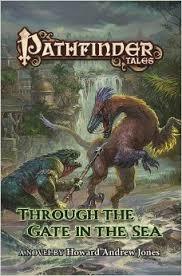 By the time I got to the third and especially the fourth of these Paizo books (Beyond the Sea of Stars and Through the Gate in the Sea) I think you can see the influence of the hardboiled writers I’d begun reading, because the tone is even a little more terse, and hopefully a little more powerful.
By the time I got to the third and especially the fourth of these Paizo books (Beyond the Sea of Stars and Through the Gate in the Sea) I think you can see the influence of the hardboiled writers I’d begun reading, because the tone is even a little more terse, and hopefully a little more powerful.
I’ve written only a handful of the Hanuvar short stories, which is odd given how much thought and time I’ve put into developing them. I’m really pleased with the tone I’m using, where if you read between the lines much more is implied than is actually stated. At least that’s my intent.
In the newest novels, as yet unreleased, I think I’m closest to my natural style, which is mostly lean, but occasionally decorative when the moment seems right.
Now as to character voice, I definitely think it’s important that characters from different places with different personalities from different places don’t sound the same. They should employ some expressions and curses that don’t echo each other. If you know your people some of their personality comes out in the way they communicate, so as is said so often, knowing your characters is really the key.
The trick is to make sure that your characters don’t all sound like the narrative voice. In my initial drafts I tend to use a lot of dashes and semicolons and one of the things I have to be careful of is that my characters don’t talk exactly the same way that the description and internal thoughts read. I have to go through multiple times and re-read and strip that stuff out.
It’s possible also to go TOO far and make your characters all sound so different from each other that it’s distracting, or like a parody. I’ve learned that it can be better to suggest a little variety with just slightly different tones and expressions rather than going full tilt. This is a related technique to that faux ancient feel I mentioned above when discussing the tone of my ancient Arabian historical fantasies — you can suggest more than there actually is, taking it halfway or even just a quarter of the way there without taking it so far that it’s annoying to readers.
May 22, 2018
Submission Reading
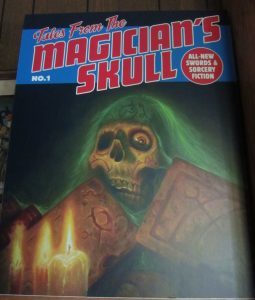 When I stepped up to be the Managing Editor of Black Gate, I started running a live journal. It seems hard to believe that was already so long ago, but when I got to looking up a post I’d written that might be of interest I saw that it dated from 2007, which kind of floored me. The years have sped past.
When I stepped up to be the Managing Editor of Black Gate, I started running a live journal. It seems hard to believe that was already so long ago, but when I got to looking up a post I’d written that might be of interest I saw that it dated from 2007, which kind of floored me. The years have sped past.
Anyway, prior to this post I had just finished reading through a big batch of Black Gate submissions, and the percentages of rejections I discuss seemed to hold in the years going forward. I expect they’ll be true when I start reading magazine submissions again, so I thought I’d give you a behind-the-scenes look at what it’s like to pull manuscripts from the envelopes, or e-mail. Have a look at what kind of things I found there, and perhaps most importantly, what submitters have done wrong. Better than learning from your own mistakes is learning from those that other people have made, right? That’s less painful.
Believe me, when we finally get around to asking for subs for Tales From the Magician’s Skull, these are the things writers really need to be aware of.
Here’s what I said back in 2007 about reading subs for Black Gate:
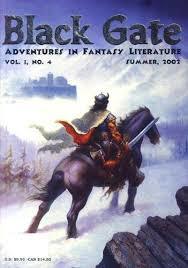 Of the 130 stories from this batch I forwarded some dozen to John O’Neill for further consideration. Since I started reading I’ve gone through a little over 550 Black Gate submissions, and of those I’ve sent some 50 on to John.
Of the 130 stories from this batch I forwarded some dozen to John O’Neill for further consideration. Since I started reading I’ve gone through a little over 550 Black Gate submissions, and of those I’ve sent some 50 on to John.
It doesn’t take too much mathematical effort to realize this means I turn over about 1 in 11 tales. Sometimes there’ll be a string of really good ones in a row and sometimes I’ll read dozens and find nothing that catches my eye. It’s not that I’m looking to pass on 1 in 11; that’s just how the numbers average out.
I thought it would be interesting to provide you with a rough statistical breakdown of those other 10 subs. After all, if I’m only passing on about 1 in 11, what’s wrong with the other 10?
It’s just wildly inappropriate – it’s a gangster story, moreover, it’s an entire gangster novel, or it’s modern poetry with no fantastic elements.
It begins with a very, very long infodump describing the history of the fantasy world, or the science fiction world, or the demon world.
It’s a fable or a myth that leaves us far removed from the characters.
It is overloaded with familiar elements like elves and quests and dragons and quests and wizards and quests OR monsters (oh no, it was REALLY a vampire!) handled in familiar ways.
It’s a bleak story about the end of the world and the few human survivors scrabbling over what’s left as they all die off. I’ve seen some very, very good versions of this story, but I’ve turned them away. If the point is that we’ll all die with a whimper, we won’t be publishing it, even though on some days I’m inclined to agree.
It opens in generic medieval tavern A and is populated by extras from D & D central casting, or begins in the midst of an adventure that reads like dungeon module B with extras from D & D central casting.
It’s a Twilight Zone style horror story or science fiction story where it’s all about the twist and not the characters.
It is dripping with adjectives but virtually devoid of character, as though whomever wrote it has been locked in a room reading Clark Ashton Smith and H.P. Lovecraft night and day for a month before putting hands to keyboard (and it must be said that it NEVER sounds as lovely as CAS, no matter how hard someone tries).
The writing’s good, but the story doesn’t have any fantasy or fantastic elements, or it’s all about the characters emoting rather than actually DOING something. Sometimes it’s a fine story and it’s just not an adventure.
The writing shows promise, but is rough around the edges. Stories like this sometimes garner a rewrite request, sometimes a “close but not quite” kind of letter, with an invitation to try again. Occassionally the writing’s quite good, but the story’s just not as original in character or world building as the last I sent on to John. These are the hardest stories to turn away, but I have to do so, because we already have more good stories than we can publish.
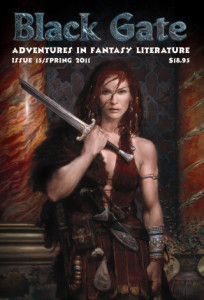 I can usually tell in the first paragraph whether I’m going to read very far into the story. Traits like what I call “word echo” (repeated use of the same word in nearby sentences), plodding pacing, infodumps, over abundance of gerunds or adjectives, generic characters or situations, even subject matter, and the names of characters and places can clue me in pretty quickly. If my attention isn’t caught by the first page and I’ve seen weak world building or matters like those I mention above, then you’ve probably lost me and I’m on to the next.
I can usually tell in the first paragraph whether I’m going to read very far into the story. Traits like what I call “word echo” (repeated use of the same word in nearby sentences), plodding pacing, infodumps, over abundance of gerunds or adjectives, generic characters or situations, even subject matter, and the names of characters and places can clue me in pretty quickly. If my attention isn’t caught by the first page and I’ve seen weak world building or matters like those I mention above, then you’ve probably lost me and I’m on to the next.
I’ve had some people get angry with me once they realize I don’t read every word of every submission, but really, if I’m not interested in the first few pages, then why would a Black Gate reader be? If my attention is caught, I keep reading. Statistically, you can see my attention is caught enough to read all the way through in only 2 or 3 out of every 11.
Oh, and if it’s really a satire on fantasy and sword-and-sorcery conventions, I won’t be interested. Our slots are few, and we want to use most of them to provide adventure, not parodies.
May 18, 2018
Novel Lessons 1: The Desert of Souls
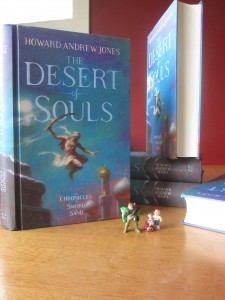 I’d like to think that I learn a little more about writing with every book, and I thought that it might be useful to my fellow writers if I shared what I’ve learned… often the hard way.
I’d like to think that I learn a little more about writing with every book, and I thought that it might be useful to my fellow writers if I shared what I’ve learned… often the hard way.
Before I ever got to the first published novel I had at least five others that didn’t make the cut. I write “at least” because three of those five were rewritten numerous times, sometimes nearly from scratch, so maybe the total is more like ten or twelve. Yeah, that many.
I am reminded of what I heard as a creative writing minor in college when a published author dropped by to talk to us. He said that it might take us multiple novels before we got published, and he cited a figure close to ten, because that’s how long it had taken him. I remember thinking to myself that I would certainly figure things out faster. Hah! The arrogance and optimism of youth. I sure thought I was special (even as I was brimming with insecurities that I really wasn’t). Would I have stuck with it so long if I’d known success wasn’t waiting around the corner? What if I’d known the advice I later heard, about having to put in about 10,000 hours before you were good enough to be professional with a skill? I think that little gem is probably pretty accurate for most of us, as it turns out.
Probably I’d still have kept at it. I’ve always wanted to be a storyteller, even if I thought I had more of a natural knack that wouldn’t require quite so much time to get right. Of course, some people get it right the first time out of the gate and win first place as well, like Lynch and Rothfuss. That’s not me, alas. Maybe you are, but the odds are that you’re not. Sorry about that, but if you’re writing your first novel it might help to approach it realistically. Or maybe to write your first one when you’re a more seasoned human being, because some of my challenge was that I hadn’t experienced enough life to write a convincing novel when I was in my 20s.
So what did I learn in the writing of my first published novel, The Desert of Souls?
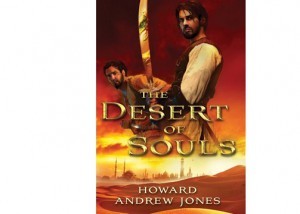 A number of lessons, really, and some I didn’t fully understand until I completed the second published novel.
A number of lessons, really, and some I didn’t fully understand until I completed the second published novel.
First, I learned that I should write what I was most excited about writing, which at that time was about my characters Dabir and Asim. I’d been writing short stories about them for nearly ten years, reading all about the period and region and time they were from that whole long while. But I’d been putting off a novel about them because I thought no one would want to read a historical fantasy novel with Arabian heroes. It turned out I was right, sadly, for not enough people read it to keep the series going, but I was wrong in the short term, because my passion and skill showed through and got me that book contract.
Second, what I didn’t understand was that because I knew the characters so very well that the writing was easy. In my spare time I ended up writing a novel in about a year, with very few revisions. At least one of the chapters reads almost exactly as I wrote it in the rough draft. That was deceptive for me, because I thought all novel writing would be like that. Later I understood that it came from knowing the characters and their reactions like the back of my hand.
Third, I thought all I needed was a simple outline, because writing that book was so easy. I was wrong there, but that simple outline was just right for that book, which went exactly where I wanted it to go even if it still surprised me sometimes. I trusted my instincts, which is something I lost sight of for a little while in later books.
I guess a related lesson is that if you know your characters and their motivations (not just the protagonists, but the villains as well) everything else falls into place far more easily. I think that’s the way Harold Lamb wrote. I wish more record of his writing process survived. All we have are a few comments here and there that he made, stating that he really didn’t like redrafting very much. As his plots rely upon collisions between motivations, I’ve come to think that his secret relies upon knowing his protagonists and antagonists, and their abilities and failings. He then set them against each other. Partly unconsciously, that’s exactly what I did in The Desert of Souls.
It would be a little while before I figured out how to write another as efficiently. Next week I’ll look at one of my favorite of my books, and one of the hardest to write, The Bones of the Old Ones.
May 17, 2018
Writing Observations: Backstory
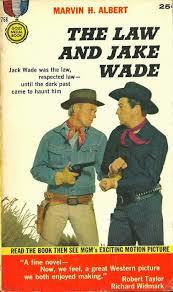 I finished reading a slim, hardboiled novel the other day of 142 pages and marveled again about how much story these good writers from the ’50s could cram into a tiny space.
I finished reading a slim, hardboiled novel the other day of 142 pages and marveled again about how much story these good writers from the ’50s could cram into a tiny space.
One of the things I liked best was that the backstory wasn’t front loaded into the plot. I think a lot of modern writers would have spun it out twice as long and shown us a bunch of scenes of the youthful years of the character as he experienced the things that shaped him. Instead, the story starts with Jake Wade’s new identity already established, then the threat to that identity is introduced. The story is in motion from the very start and anything we don’t know acts as an enticement to find out the secrets behind it all. Boy do I love that style more.
I wonder if it says something about the era in which I grew up, where as a boy I admired and emulated men who had still waters that run deep, and didn’t talk about problems. Not that I was successful, because I tend to wear my heart on my sleeve, but I aspired to be more like that. Those were the models I saw around me and those are the models I saw on television and in the movies. Of course those models had some things wrong with them, too — the inability to communicate, for instance — but I still admire the habit of not spewing your problems and backstory over everybody you meet. Maybe the tendency to do that in some modern fiction is a backlash against being too closed in.
Anyway, two thumbs up for The Law and Jake Wade, and I’m looking forward to seeing the movie now, which is supposed to be a pretty strong old western.
It’s not until page 134 (of those 142) where we finally get a little window into how a man who’s good now ended up running with a bad bunch in the past, because it’s necessary for Jake to try and explain himself to the woman he loves over breakfast before he makes his final goodbye. Here, I’ll excerpt this text from Marvin Albert’s book:
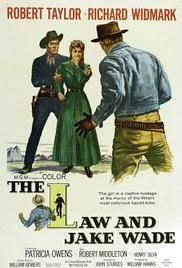 Jake wanted a smoke. He wished he’d bought the makings. It would have given him something to do with his hands. He picked up his fork and began fiddling with it.
Jake wanted a smoke. He wished he’d bought the makings. It would have given him something to do with his hands. He picked up his fork and began fiddling with it.
“I don’t know,” he told her. “My folks and all the people I grew up around, were straight and hard-working. I remember my father working around the clock to get a little spread going for us. Only he died when I was a kid. My mother tried to keep the spread going, but I guess it was too hard on her. She died a few years after my father.”
Jake felt awkward and foolish, telling someone else things that had meaning only for himself. No one else could feel what he did about it; all his life he’d watched folks work themselves into the ground and end up with nothing in their hands but the callouses of old blisters.
I think the most interesting part of this is probably the third paragraph from its start up until the semicolon, explaining how Jake feels awkward explaining something that’s only important to him. These are his concerns, not anyone else’s. Of course the very problem with that kind of thinking is demonstrated by the denouement, because when Jake explains himself his girlfriend’s loyalty deepens. On the other hand, if he’d been talking about it sooner not only would we have had a shorter story, we’d also have had a whiny character who wasn’t very self-sufficient.
Good stuff. Once again Marvin Albert delivers. I’ve yet to read a single book by him I haven’t liked. Maybe I haven’t seen him yet deliver an A+ book, but there’s really something to respect about a guy who always provides a B or better. He’s dependably good.
May 15, 2018
Mighty Warriors
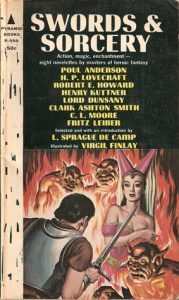 I wanted to point everyone to the new sword-and-sorcery anthology, The Mighty Warriors. My old friend Paul McNamee has a story within — along with David C. Smith and the mighty Charles Saunders and other talented folks– and it is graced with a Bruce Timm cover. Visit for a lowdown on the table of contents and a good look at the artwork.
I wanted to point everyone to the new sword-and-sorcery anthology, The Mighty Warriors. My old friend Paul McNamee has a story within — along with David C. Smith and the mighty Charles Saunders and other talented folks– and it is graced with a Bruce Timm cover. Visit for a lowdown on the table of contents and a good look at the artwork.
It’s gotten me thinking about sword-and-sorcery anthologies and mulling which old ones are my favorites. What about you?
As I’m away from home right now I can’t step over to look at my bookshelf to search through individual volumes. I know I was always a little disappointed in the Flashing Swords anthologies, and fond of the Swords Against Darkness collections. As to single volumes, though, it gets tougher. How to judge? Some are strong collections but hold stuff I have in other collections. Doesn’t mean that they’re not a strong sample of the good stuff…
May 13, 2018
Tales From the Magician’s Skull Issue 2
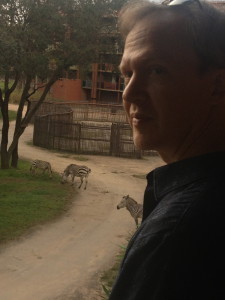 Just this weekend I double-checked all the final changes for the stories intended for issue 2, and now it’s getting close to release ready. The art’s in place, the stories are in place, the ads are all there… it’s just a grand looking product. Some of the authors I’d hope to include didn’t have time to finish a story or didn’t have time to draft a heroic fiction tale, but I hope that they’ll all be in the magazine eventually, and I’m mightily pleased with the writers we do have.
Just this weekend I double-checked all the final changes for the stories intended for issue 2, and now it’s getting close to release ready. The art’s in place, the stories are in place, the ads are all there… it’s just a grand looking product. Some of the authors I’d hope to include didn’t have time to finish a story or didn’t have time to draft a heroic fiction tale, but I hope that they’ll all be in the magazine eventually, and I’m mightily pleased with the writers we do have.
I’ve been contemplating some changes to the web site, at least in the way I present it. I intend to start discussing editing and writing more frequently, along with publishing tips, and I hope to start inviting some guests by with a lot more frequency. I may also get around to changing the banner up at the top, as it’s based on The Bones of the Old Ones. I happen to be very proud of that particular book, and while I’d still like more people to read it, I think it’s time to start promoting the next one.
Likewise I’ll check up on my links, updating to get rid of ones that don’t work, and adding links to some other web sites I visit with regularity. It’s time for a spring cleaning, so to speak. I’ve been spending a lot of time on the yard, and on the inside of the house, so I might as well take that clean-up process to the web site.
Are there any topics that you wish me to discuss more regularly?
May 11, 2018
The Liberation: An Interview with Ian Tregillis
Last year I sat down with Ian Tregillis over at Black Gate to discuss his new book. Tregillis is one of the few modern writers I go out of my way to read, and I think my regular readers would really enjoy him.
Here’s a reprint of that discussion:
As John O’Neill wrote in November of 2016, the last book in Ian Tregillis’ new trilogy comes out this month (December 2016). I’m a big fan of Tregillis, and was fortunate enough to read The Liberation in manuscript. It was a blast, and you should buy it it. Seriously. Go buy the trilogy, and if you already have the first two, go buy the third.
Alright. Now that you’ve done that, Ian and I kicked back last and talked about his trilogy. Here’s what he had to say:
Howard: You’re on an elevator with your new book when Ringo Starr enters, sees the cover and says how fab it looks. He wants to know what the book’s about – what do you tell him?
Ian: OK. First of all, I’d probably be hard pressed not to lose my composure the moment he stepped into the elevator. I mean, there I’d be sharing an 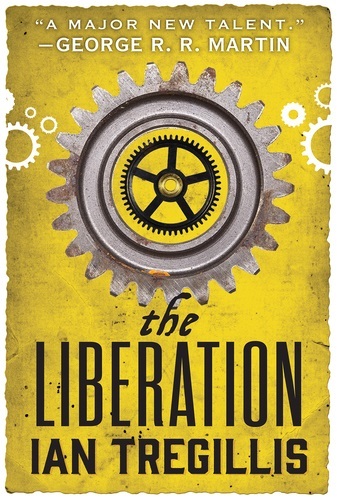 elevator with A BEATLE. I discovered their albums at just the right age, and I swear I listened to that music practically nonstop during high school. So keeping it cool would be a challenge, *especially* if Ringo asked about the book.
elevator with A BEATLE. I discovered their albums at just the right age, and I swear I listened to that music practically nonstop during high school. So keeping it cool would be a challenge, *especially* if Ringo asked about the book.
But assuming I could recover my composure enough to speak coherently without babbling, and assuming he wanted the long version, I’d tell him it’s an adventure story about a clockpunk Terminator apocalypse in a world where the industrial revolution never happened, disguised as a story about slave rebellion and Free Will.
If he wanted the short version, I’d tell him it’s basically Rock ‘Em Sock ‘Em Robots but with more swearing and stabbing.
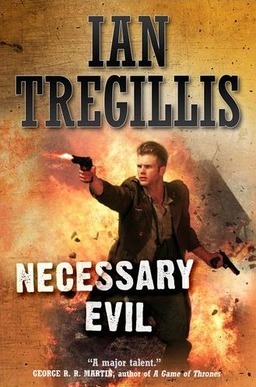 Speaking of those robots, what interested you in mechanical men, and how did you come upon the particular time period and circumstances? I don’t imagine it was simply a matter of “well, THIS has never been done before.” I mean, it’s not just steampunk, it’s set in an alternate history that diverges in a very different place, and gives power to the Dutch.
Speaking of those robots, what interested you in mechanical men, and how did you come upon the particular time period and circumstances? I don’t imagine it was simply a matter of “well, THIS has never been done before.” I mean, it’s not just steampunk, it’s set in an alternate history that diverges in a very different place, and gives power to the Dutch.
Back when I was writing the Milkweed Triptych (and, oddly, continuing with the theme of my evolving musical tastes) I stumbled across the music of Abney Park, which had just undergone its transition from goth to steampunk. I listened to a lot of their music after that, and found many of their songs sparking story ideas for me. I kept flashing back to this fascinating image of clockwork men and women, and eventually developed a pretty solid sense that I’d like to wrap a book around that conceit.
Some time after that, around 2010 or 2011, I was invited to contribute a story to an anthology titled, “Human for a Day.” I decided to use that story as a playground for exploring the clockwork-person idea. I had a vague notion the short story would be about a clockwork robot trying to find a secret locksmith who could pick the lock on his imprisoned soul, but I really didn’t know anything about the world around him. And I needed a setting before I could start writing the anthology piece.
I decided the easiest and most natural piece of worldbuilding would be terminology for the clockwork servitors. If they were common in this world, there’d be slang terms for them. Furthermore, I reasoned, if they were basically walking clocks, they’d be loud, and the resulting slang might be onomatopoeic. So then I started doodling at the keyboard, trying to invent a word that evoked the sound of a mechanical slave going about its business. Nothing really landed until I hit “clakker”. Who knows why, but for some reason that made me think of Dutch (a language I don’t speak), at which point my brain lit up.
 I knew from the science side of my life that Christiaan Huygens had been a Dutch mathematician/ astronomer/ early physicist, and an inventor of the pendulum clock. I also knew he’d been a contemporary of Isaac Newton, and that Newton had been deeply into alchemy. Well, gosh: what if, centuries earlier, Huygens had stolen Newton’s alchemical research, combined it with horology, and invented sentient clockwork slaves? This would have been right around the time that Catholic Louis XIV of France had invaded the Protestant Netherlands, too, and not terribly long before the Dutch would eventually give up the city of New Amsterdam…
I knew from the science side of my life that Christiaan Huygens had been a Dutch mathematician/ astronomer/ early physicist, and an inventor of the pendulum clock. I also knew he’d been a contemporary of Isaac Newton, and that Newton had been deeply into alchemy. Well, gosh: what if, centuries earlier, Huygens had stolen Newton’s alchemical research, combined it with horology, and invented sentient clockwork slaves? This would have been right around the time that Catholic Louis XIV of France had invaded the Protestant Netherlands, too, and not terribly long before the Dutch would eventually give up the city of New Amsterdam…
In an instant, I had an entire new world in my head. That’s a really great (but unfortunately for me, rare) feeling for a writer.
So that became the setting for the story. But I knew instantly that the world was too big and complex for 7,000 words. It deserved its own book. Later, Orbit convinced me that it was really too big for a single book, and that it deserved several. They were right. (Oddly, the Milkweed Triptych *also* grew out of people convincing me, correctly, that my idea was too big for a single book.)
That’s a somewhat lengthy answer to your question, but there you go.
I always like hearing the background details behind creative projects — well, at least the ones I’ve enjoyed. Often, the ideas I like most are ones that spring from the random confluence of several seemingly unrelated concepts. One of the things I love about your writing is how compelling it is even as it mixes those concepts around. Do you take any conscious steps to keep that plot continually tugging the reader forward?
 That’s one of the best compliments a writer can receive, so thank you sincerely for that. I’ll tell you honestly, it never feels compelling when I’m writing it. I tend to get bored pretty easily, in fact, so I’m constantly looking for ways to keep things personally interesting. Otherwise the writing can become a deadly slog. I suppose that means I’m also trying to look at what I’ve written from a reader’s perspective, and worrying about how dull it’s getting.
That’s one of the best compliments a writer can receive, so thank you sincerely for that. I’ll tell you honestly, it never feels compelling when I’m writing it. I tend to get bored pretty easily, in fact, so I’m constantly looking for ways to keep things personally interesting. Otherwise the writing can become a deadly slog. I suppose that means I’m also trying to look at what I’ve written from a reader’s perspective, and worrying about how dull it’s getting.
I’ve found that when a scene is giving me trouble, it’s sometimes because I’m approaching it in a way that isn’t engaging my interest. When I notice that happening, I step back and ask myself, “What’s being accomplished by this scene? Do I really need this scene? What’s a more original or more interesting way to approach this? What can I put into this scene that would make it fun to write?” Sometimes the best question to ask myself is, “If I were reading this book instead of writing it, what would keep me going a little longer?”
Sometimes that’s just a matter of juicing up the dialogue. Or discovering a character’s voice. Or revealing some nifty corner of the world. Or teasing a revelation. Or letting somebody get stabbed in the eye. You know, whatever.
I know we share a love of the works of Zelazny and Chandler. Very different writers, obviously, but I think I’ve detected a common thread that explains why I find their work so compelling: the element of surprise. With Chandler, it’s the constant thrills delivered by his spectacular and unpredictable prose. Never knowing what ingenious turn of phrase will hit me next more than makes up for plotting and characterization that’s a little predictable at times. With Zelazny, it’s not only surprising prose but also surprising worldbuilding, surprising storytelling. I call this the “fractal dimensionality of surprise” and could deliver a 20 minute speech outlining my theory (I have, in fact) but I’ll spare you.
I’ll never be a Zelazny or a Chandler, but I can at least learn from them. So I try to keep things surprising, in large ways and small.
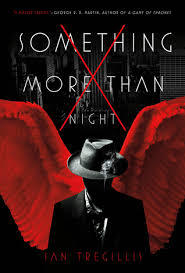 None of can ever be another Zelazny or Chandler, although many of us can try. My guess is that sooner or later some of us will be trying to write like Ian Tregillis, and probably want to know details like those asked by certain prescient interviewers. For instance, how long were you working on the Alchemy Wars books? Is this a long germinating idea, or one that burst fully formed that demanded you start work on it immediately?
None of can ever be another Zelazny or Chandler, although many of us can try. My guess is that sooner or later some of us will be trying to write like Ian Tregillis, and probably want to know details like those asked by certain prescient interviewers. For instance, how long were you working on the Alchemy Wars books? Is this a long germinating idea, or one that burst fully formed that demanded you start work on it immediately?
That revelation about the world I described earlier happened not long after I finished the Milkweed Triptych. But at that point I’d already promised myself that I’d write Something More Than Night, my angel-noir Raymond Chandler pastiche (I wouldn’t claim it rises to the level of homage), a project I’d been itching to tackle for years. So Clakkers went on the back burner for a year or two. But they came back when I started casting about for a new project after finishing the angel book.
Once I actually started the Alchemy Wars books, it was a little over 4 years from typing “Chapter 1” in the first draft of The Mechanical to the release of the third and final novel, The Liberation. About 3 and a half years of actively working on the books, I suppose. I’m not a screamingly fast writer.
What’s next for Ian Tregillis?
No robots, that’s for damn sure.
I do have an idea I’m playing with right now, but it’s too early to discuss it publicly. Right now I’m just trying to see if I can nurture it into something that wants or deserves to be a book. I’m excited about the concept, but it’ll require a substantial departure from the writing process that served me over the past 7 books. And who knows– even if I do write it, there’s no guarantee anybody will want to publish it!
 What do you want people to find in your works, best case scenario?
What do you want people to find in your works, best case scenario?
I just hope people find some entertainment in my books! That’s the only reason I write, after all — to entertain myself.
Which of your characters from these books would you most like to sit down with for a casual conversation, and why? I think I’d vote for Jax, myself. He seems pretty gear, as Ringo might say.
I see what you did there.
I’d hate missing the chance to witness a walking, talking, sentient clockwork person. So, yeah, I guess Jax. I mean, he’s probably the safest choice from among the Clakkers…
Although, to be perfectly honest, he was never the most interesting character to write. He’s central to the story — the books had to have a Jax character — but his scenes were rarely fun to write. Instead, it was Berenice who leapt from the page the moment I first envisioned her dangling over the fortress walls of Marseilles-in-the-West, dolled up in a Marie Antoinette getup with a torch in hand, studying a clockwork killer.
Yeah. I’d like to go out for drinks with Berenice.
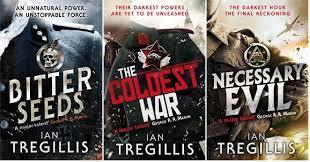 She’s clever, dangerous, brilliant, and sexy. A happily married man like me should probably steer clear. I should say, though, that while those scenes may have been hard to write, they worked wonderfully. Jax proved engaging and sympathetic. But that’s part of the mystery of writing, isn’t it? That if we do write properly, no one can tell whether a scene was an incredible challenge or popped off polished in a single draft. I wish the latter happened more often.
She’s clever, dangerous, brilliant, and sexy. A happily married man like me should probably steer clear. I should say, though, that while those scenes may have been hard to write, they worked wonderfully. Jax proved engaging and sympathetic. But that’s part of the mystery of writing, isn’t it? That if we do write properly, no one can tell whether a scene was an incredible challenge or popped off polished in a single draft. I wish the latter happened more often.
Well, thank you for the reassurance. I’m glad I didn’t kill him off back in the first book of the trilogy, which I’d been tempted to do…
I think you’re right on the money. If we do our jobs properly, the background struggles should be invisible to the reader. I consider rewriting part of the writing process — it’s really where a lot of the heavy lifting is done, at least for me. I often say (because I know it to be true) that I’m a far better rewriter than writer. Rewriting is, I think, where the really uncooperative scenes get sanded down and smoothed to fit seamlessly (one hopes) with the less obstreperous ones.
One of the most helpful pieces of writing wisdom I’ve come across, originally from Gaiman, goes something like this (paraphrased like mad): Some days the writing is easy. Sometimes it’s extremely difficult. But when it’s all said and done, readers won’t necessarily know which bits were easy and which bits were hard. I take great solace in that.
Thanks for taking the time for our virtual sit-down!
It was my pleasure. Thanks for the opportunity!
May 9, 2018
Lankhmar
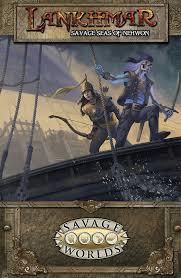 I wrote a Lankhmar book for the Savage Worlds game system, and the Kickstarter for it went live last week.. It’s probably as close as I’ll ever get to writing a story starring Fafhrd and the Gray Mouser.
I wrote a Lankhmar book for the Savage Worlds game system, and the Kickstarter for it went live last week.. It’s probably as close as I’ll ever get to writing a story starring Fafhrd and the Gray Mouser.
I had a blast writing the thing, but my favorite parts were designing adventures — which I did my very best to make feel Leiberish — and designing the adventure generator, which seems to create Leiber-like stories well enough that I used it to generate two of the adventures I wrote up for the book.
Howard Andrew Jones's Blog
- Howard Andrew Jones's profile
- 368 followers



